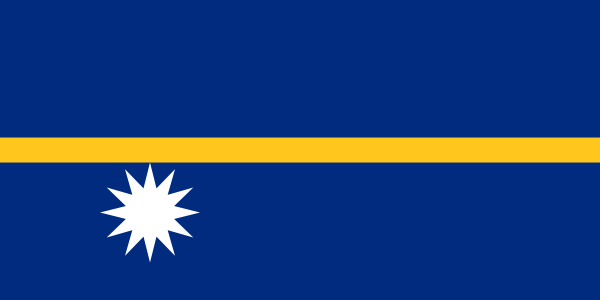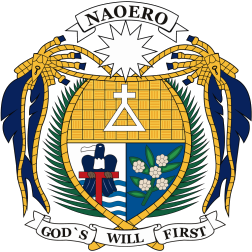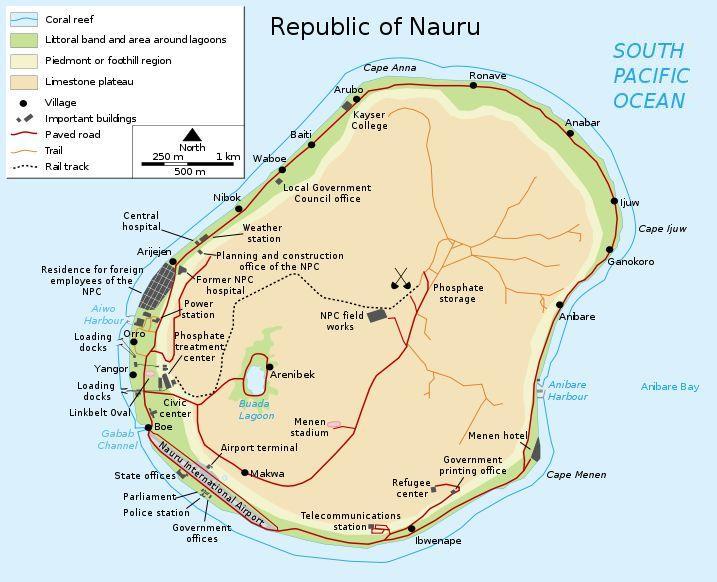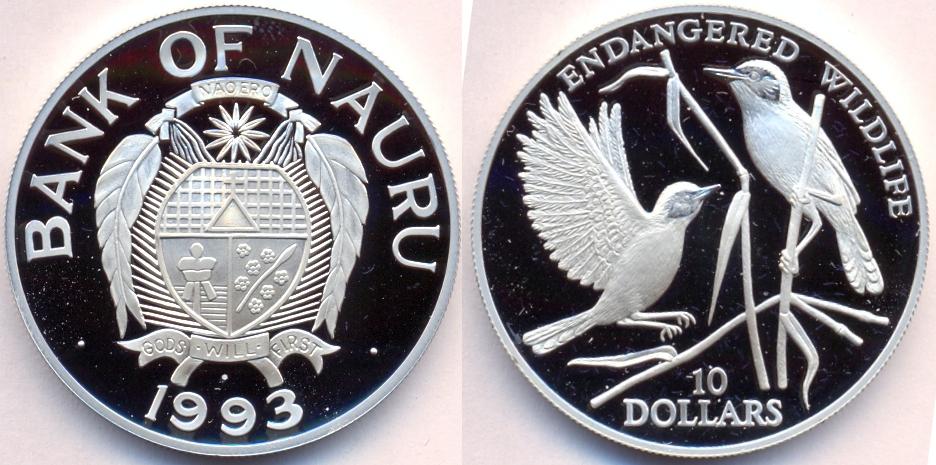| |
 |
 |
| |
|
Nauru |
| |
 |
 |
| |
08 Nov 1798 Discovered by British Capt. John Fearn, named Pleasant
Island.
1878 - 1888
Civil war among the 12 traditional clans.
21 Oct 1887 German protectorate (Nauru).
14 Apr 1888 Part of (German) Marshall Islands.
01 Apr 1906 Part of German New Guinea (Papua New Guinea).
04 Aug 1914 Australian naval forces remove German officials and a German
radio post, then depart.
07 Sep 1914 Australian occupation.
Sep 1914 - Jun 1921 Part of
the British Western Pacific Territories.
17 Dec 1920 League of Nations mandate (to Australia, New Zealand, and
United Kingdom; actual administration by Australia).
26 Aug 1942 - 13 Sep 1945 Japanese occupation.
01 Nov 1947 United Nations trust territory (to Australia, New Zealand,
and United Kingdom; actual administration by Australia).
31 Jan 1968 Independence (Republic of Nauru). |
|
|
|

|
| |
An island in
the west-central Pacific, directly on the equator, southeast of Micronesia
and west of Kiribati.
Visited with increasing frequency by Europeans, especially whalers, from
1798. No official capital;
government offices in Yaren District.
Currency: Australian Dollar (AUD). The Republic of Nauru, formerly Pleasant
Island, is an island republic in the western Pacific Ocean west of the
Gilbert Islands. It has an area of 21 km2 (8-1/2 sq. mi) and a population of around
8,000. The island was discovered in
1798. It was annexed by Germany in 1888 and made a part of the Marshall
Island protectorate. It is known for its phosphate deposits. Phosphate was discovered on Nauru in 1900 by the
prospector Albert Ellis. In 1914 the island was occupied by Australia and placed
under mandate in 1919. The British Phosphate Commission (BPC), formed in
1919, controlled the entire economy of Nauru, owned much of its
infrastructure and financed the official administration, and thus they may
be considered as co-administrators of Nauru. The share of each of the three
powers in the operation was: Australia 42%, U.K. 42% and New Zealand 16%.
The phosphate was only to be exported to the three countries. In 1927, the
BPC also formalized the unofficial habit of paying a royalty to the Nauruans,
that existed since the German period. The Commission also controlled the
phosphate mining on Christmas Island and Ocean (Banaba) Island. During World
War II it was seized by the Japanese in August, 1942. It became a joint
Australian, British and New Zealand trust territory in 1947 and remained as
such until it became an independent republic in 1968. Nauru has a unique
relationship with the Commonwealth of Nations. |
| |
| Currency:
Australian Dollar is used in Nauru. Despite that Nauru has issued some
commemorative coins since it's silver jubilee of independence in 1993. |
| |
|
 |
KM#5 10 Dollars. Year:
1993.
Weight: 31.47g.
Metal: 0.925
Silver. Diameter:
41.00 mm. Edge:
Reeded.
Alignment: Medal.
Mint: N/A.
Obverse: National arms. Reverse:
Songbirds.
Mintage: 10,000 (estimated).
Minted Years: One
year type.
Subject:
Endangered Wildlife.
President:
Bernard Annen Auwen Dowiyogo (2nd time). |
|
| |
| |
|
Brief history with Nauru rulers: |
| |
- Head Chiefs
(styled 'kings' by Europeans)
- Auweyida (1st
time).....................................18..
- 1878?
- He was deposed during the
civil war; mentioned as no longer ruling in 1881
- Unknown ruler 1878 - 1888.
- Auweyida (2nd
time).....................................1888
- c. 1920
-
Germany..........................................14 Apr 1888 - 07 Sep 1914
-
Australia........................................07 Sep 1914 - 17 Dec 1920
- League of Nations
mandate (UK, Australia & NZ)...17 Dec 1920 - 26 Aug 1942
- Head Chiefs of the Council of Chiefs
-
Daimon.............................................1927 - 1931
- Timothy Detudamo...................................1931
- 18 Dec 1951
- Governor of the Nauruans
from 1942 to 30 Jun 1943. Exiled in Truk Micronesia from 30 Jun 1943 to 31
Jan 1945.
-
Japan............................................26 Aug 1942 - 13 Sep 1945
- Japanese troops occupied
Nauru on 26 August 1942. The Japanese troops built an airfield on Nauru
which was bombed for the first time by U.S. Air force on 25 March 1943,
preventing food supplies from being flown to Nauru.
- Occupied by Allied
military forces...............13 Sep 1945 - 01 Nov 1947
- United Nations
trust territory...................01 Nov 1947 - 31 Jan 1968
- Head Chiefs of the Local Government
Council
- Timothy Detudamo (continued)................18
Dec 1951 - Apr 1953
- Raymond Gadabu.....................................1953
- Dec 1955
- Hammer DeRoburt................................Dec
1955 - 31 Jan 1968
- Republic of
Nauru................................31 Jan 1968 - date
- Nauru became self-governing in January 1966, and
following a two-year constitutional convention, it became independent in
1968, led by founding president Hammer DeRoburt. In 1967, the people of
Nauru purchased the assets of the British Phosphate Commissioners, and in
June 1970, control passed to the locally owned Nauru Phosphate Corporation.
Income from the exploitation of phosphate gave Nauruans one of the highest
living standards in the Pacific and per capita, in the world.
- Chairman of the Constitutional
Convention
- Hammer DeRoburt (continued)....................................31
Jan 1968 (few hrs)
- Chairman of the Council of State
- Hammer DeRoburt (continued)......................31
Jan 1968 - 18 May 1968
- Presidents
- Hammer DeRoburt (continued
- 1st time)...........18
May 1968 - 22 Dec 1976
- Bernard Annen Auwen
Dowiyogo (1st time)..........22
Dec 1976 - 19 Apr 1978
- Lagumot Gagiemem
Nimidere Harris (1st
time)......19 Apr
1978 - 11 May 1978 (22
days)
- Hammer DeRoburt (2nd
time).......................11
May 1978 - 17 Sep 1986
- Kennan Ranibok Adeang
(1st time).................17
Sep 1986 - 01 Oct 1986 (14
days)
- Hammer DeRoburt (3rd
time).......................01
Oct 1986 - 12 Dec 1986 (43
days)
- Kennan Ranibok Adeang
(2nd
time).................12
Dec 1986 - 22 Dec 1986 (10
days)
- Hammer DeRoburt (4th
time).......................22
Dec 1986 - 17 Aug 1989
- Nangindeit Temanimon
Kenas Aroi..................17 Aug 1989 - 12 Dec 1989
- Bernard Annen Auwen
Dowiyogo (2nd
time)..........12
Dec 1989 - 22 Nov 1995
- Lagumot Gagiemem
Nimidere Harris (2nd
time)......22 Nov
1995 - 12 Nov 1996
- Bernard Annen Auwen
Dowiyogo (3rd time)..........12
Nov 1996 - 26 Nov 1996 (15
days)
- Kennan Ranibok Adeang
(3rd time).................26
Nov 1996 - 19 Dec 1996 (23
days)
- Rueben James
Kun.................................19 Dec 1996 - 13 Feb 1997
- Kinza Godfrey Clodumar...........................13
Feb 1997 - 18 Jun 1998
- Bernard Annen Auwen
Dowiyogo (4th
time)..........18
Jun 1998 - 27 Apr 1999
-
René Reynaldo Harris (1st
time)..................27
Apr 1999 - 20 Apr 2000
- Bernard Annen Auwen
Dowiyogo (5th
time)..........20
Apr 2000 - 30 Mar 2001
-
René Reynaldo Harris (2nd
time)..................30
Mar 2001 - 09 Jan 2003
- Bernard Annen Auwen
Dowiyogo (6th
time)..........09
Jan 2003 - 17 Jan 2003 (09
days)
-
René Reynaldo Harris (3rd
time)..................17
Jan 2003 - 18 Jan 2003 (01
day)
- Bernard Annen Auwen
Dowiyogo (7th
time)..........18
Jan 2003 - 10 Mar 2003 (51
days)
- He died as President of
Nauru on 10 Mar 2003.
-
Derog Gioura (acting
to 20 Mar 2003).............10
Mar 2003 - 29 May 2003
-
Ludwig Derangadage Scotty
(1st time).............29
May 2003 - 08 Aug 2003
-
René Reynaldo Harris (4th
time)..................08
Aug 2003 - 22 Jun 2004
-
Ludwig Derangadage Scotty
(2nd time).............22
Jun 2004 - 19 Dec 2007
-
Marcus Ajamada Stephen...........................19 Dec 2007 - 10 Nov 2011
- He is also a former
top-class weightlifter, winner of seven gold medals and five silver at the
Commonwealth Games from 1990 to 2002.
-
Frederick William "Freddie" Pitcher..............10 Nov 2011 - 15 Nov 2011
- Pitcher became the
President of Nauru on 10 November 2011, following the resignation of his
predecessor, former President Marcus Stephen. He lost a parliamentary vote
of confidence and lost the presidency on 15 November 2011 after only six
days in power.
-
Sprent Arumogo Dabwido...........................15 Nov 2011 - 11 Jun 2013
- Baron Divavesi Waqa..............................11
Jun 2013 - 27 Aug 2019
- In parliamentary elections
(turnout 95.8%) on 24 August 2019, 19 nonpartisans are elected. President
Baron Waqa loses his seat. On 27 August, Lionel Aingimea is elected
president, defeating David Adeang by 12 votes to 6. On 28 August, Aingimea
names his cabinet, including himself as foreign minister, Martin Hunt as
finance minister, and Isabella Dageago as home affairs minister.
- Lionel Aingimea..................................27
Aug 2019 - date
|
| |
| |
|
|
| |
|
|
| Countries
/ Territories |
| |
|
Chiefa Coins | |
|





